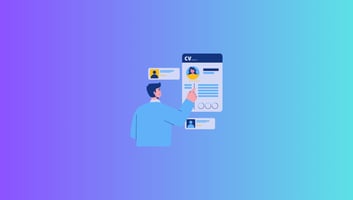Artificial Intelligence (AI) has moved from a theoretical concept to a non-negotiable tool in...
Advantages and Limitations of AI-Driven Tools for Engineering Recruitment
The recruitment landscape, particularly in specialized fields like engineering, is undergoing a rapid transformation powered by Artificial Intelligence. AI tools promise to revolutionize the way HR leaders and hiring managers approach talent acquisition, offering solutions to scale sourcing and eliminate bias.
However, adopting AI in engineering recruitment is not a silver bullet. Understanding both the powerful capabilities and the inherent limitations of these tools is crucial for building a successful, ethical, and high-quality hiring strategy.
Key Advantages of Integrating AI in Recruitment
AI tools excel at handling high-volume, repetitive, and data-intensive tasks, immediately boosting efficiency and allowing human recruiters to focus on high-touch candidate engagement.
1. Accelerated Sourcing and Candidate Screening
AI can instantly parse thousands of resumes and technical profiles, identifying candidates whose skill sets precisely match the job requirements (including niche languages, complex frameworks, or specific project experience). This dramatically reduces the time recruiters spend manually reviewing applications.
-
Efficiency: AI automates the initial screening, filtering out unqualified candidates and focusing human attention on the top 10%.
-
Broadened Reach: AI-powered sourcing algorithms can map vast networks of passive candidates, reaching technical talent that traditional job boards often miss.
2. Enhanced Objectivity and Reduced Bias
One of the most significant promises of AI is the mitigation of unconscious human bias in the initial screening phase. By focusing purely on skills and keywords defined in the job requirements, AI systems can bypass biases related to name, gender, or educational institution prestige.
-
Fairness: Tools can analyze language in job descriptions to flag and remove biased wording, leading to a more diverse applicant pool.
-
Consistency: Every candidate is assessed against the same criteria, ensuring a consistent and objective initial evaluation.
3. Optimized Candidate Experience
AI-driven chatbots and communication tools provide instant responses to candidate queries, improving engagement and reducing drop-off rates, particularly during non-business hours. This 24/7 responsiveness is critical in the competitive market for top engineering talent.
Critical Limitations and Ethical Considerations
Despite the clear benefits, relying too heavily on AI tools, particularly in complex engineering and executive recruitment, carries significant risks.
1. The "Black Box" Problem and Explainability
AI systems are only as good as the data they are trained on. If historical data contains inherent biases (e.g., favoring male candidates or graduates from a single university), the AI will replicate and even amplify that bias, creating a "Black Box" that is hard to audit or explain.
-
Risk to Quality: Over-reliance on keyword matching can lead to the rejection of highly skilled candidates whose resume language doesn't perfectly align with the algorithm's expectations.
2. Inability to Assess Soft Skills and Cultural Fit
Engineering recruitment often requires assessing critical non-technical competencies like leadership potential, conflict resolution, strategic thinking, and cultural fit—areas where AI currently fails.
-
Missing Context: AI cannot understand the context or scale of a candidate's achievement (e.g., how they managed a crisis or influenced a cross-functional team), which is vital for high-value roles.
3. Data Privacy and Compliance Challenges
Implementing AI tools requires collecting and processing vast amounts of candidate data. This raises serious concerns regarding data privacy (especially under regulations like GDPR) and the ethical use of personal information. Companies must ensure their AI vendors are fully compliant, or face significant legal risk.
Conclusion: A Hybrid, Strategic Approach
AI is best viewed not as a replacement for human recruiters, but as a sophisticated co-pilot. For engineering recruitment to succeed, especially when hiring specialized or senior talent, it requires a hybrid strategy:
-
Leverage AI for initial sourcing, data processing, and administrative efficiency.
-
Prioritize Human Expertise for technical deep dives, behavioral interviews, cultural assessment, and complex negotiation.
By strategically balancing AI's speed with human judgment, HR leaders can build a superior talent acquisition engine.
To explore further strategies, frameworks, and expert advice for building a world-class in-house or hybrid recruiting function, consult our central guide: The Modern Talent Acquisition Handbook.
About MindHunt
MindHunt is an AI driven recruitment firm. We believe that the traditional recruitment model is broken - relying on "posting and praying" is a waste of your time and money. We work with active and passive candidates and use AI to do sourcing and outreach faster. We use AI not to replace human connection, but to enable it.
Our technology does the heavy lifting of searching, so our expert consultants can do what they do best: building relationships, understanding nuance, and judging cultural fit. We are your partners in talent acquisition, based in Ukraine and serving the world, dedicated to connecting visionary companies with the exceptional leaders and specialists they need to grow.


